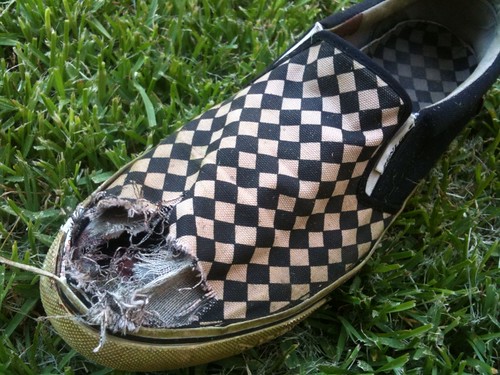 Silly me. I was mowing the lawn the other day and I stupidly managed to get my big toe caught in the mower blade while it was running at full speed. The blades ripped right through my shoe and mangled the tip of my big toe. Needless to say, it really hurt! I was home on my own, and had to figure out what to do next… there was blood going all over the place, I felt myself going into shock, as I tried to figure out how to get myself to a doctor. It was not a lot of fun. The good news is that despite smashing my toenail off and slicing the end of my big toe, it could have been a hell of a lot worse. Fortunately, the bone was not broken and I still have all my toes so apart from a bit of pain and inconvenience I think I’m pretty lucky.
Silly me. I was mowing the lawn the other day and I stupidly managed to get my big toe caught in the mower blade while it was running at full speed. The blades ripped right through my shoe and mangled the tip of my big toe. Needless to say, it really hurt! I was home on my own, and had to figure out what to do next… there was blood going all over the place, I felt myself going into shock, as I tried to figure out how to get myself to a doctor. It was not a lot of fun. The good news is that despite smashing my toenail off and slicing the end of my big toe, it could have been a hell of a lot worse. Fortunately, the bone was not broken and I still have all my toes so apart from a bit of pain and inconvenience I think I’m pretty lucky.
It highlighted to me – in a very real way – that lawnmowers are bloody dangerous things! With their sharp, rapidly rotating blades, they are obviously capable of doing some real damage to the human body. Naturally, I never intended to get my toe in the way of the blades, but it happened regardless.
So I ask the question… are lawnmowers simply too damn dangerous? Does having an accident like this mean I should get rid of the mower and never mow the lawn again? Should I be campaigning for all mowers to be banned, as I am now clearly able to prove that they are dangerous things capable of causing serious injury. Should my local council be stepping in and confiscating the lawnmowers of my neighbours in order to ensure that nobody else can ever have a similar accident?
The answer to the these questions is obviously no. While mowing your lawn can be a potentially dangerous activity, full of inherent risks and sharp rotating blades, it’s still something that needs to be done, and is done, by people all over the world every weekend. Of course, mower manufacturers do what they can to limit the risks; the rotor is covered by a large protective guard so the blades are not directly exposed to fingers and toes. Within reason, lawnmowers are designed to be as safe as possible, but no design is 100% failsafe. There are still significant risks, in fact over 60,000 people are injured by lawnmowers each year in the US alone, and many of these injuries result in amputation. With such obvious dangers posed by lawnmowers, I can only assume that people must enjoy the value of having a nice looking lawn more than they are worried about the risks of using a mower to get one.
I’m pondering these ideas and thinking how they apply to the way most schools treat potential risks for their students. While educators have a clear duty-of-care obligation to protect our students, we also have to balance that with the need to allow them to learn and to grow and to have opportunities. Without being given a chance to fail and to make mistakes, they are missing valuable opportunities to learn from those mistakes. I think there has to be a balance between exposing them to risks and providing them with responsibilities.
Clearly, if the risk is a physical one that could cause genuine harm, injury or even death, then we need to err on the side of caution. If a student is likely to be injured or hurt then, yes, we probably need to place greater emphasis on protecting them from risk than providing a learning opportunity. But if the risks are minimal, statistically unlikely, or have a relatively minor negative impact, then I think we should be encouraging our students to take a few risks and benefit from the possible opportunities. You can’t live a life where you let the potential risks override the potential opportunities; if you do you’ll miss far too many wonderful opportunities.
I got thinking about this as I read through the comments on my previous post. That post was about treating students with enough trust and respect to assume they will make good decisions for themselves if we provide them with enough opportunities to do so, and I finished that post by asking the question “What’s the worst thing that could happen?” A couple of commenters pointed out that bad things certainly COULD happen if we don’t protect our students, and so we should continue protecting them by filtering, blocking and limiting access to web content that might be seen as “bad”. As usual, the discussion revolved around the “what if we get sued for letting our children see/do/experience things that aren’t ‘safe’?” line of reasoning. While I agree we need to keep kids safe, I think that this the wrong reason for wanting to do it. Deciding what we will or won’t do based on whether we might get sued for it is simply an awful way to go through life.
You know what? We can try to protect ourselves from risk for the rest of our lives. We can avoid doing anything remotely dangerous, just in case we get hurt. We can wrap ourselves in cotton wool, cloistering ourselves away from anything we might find bad, distasteful, dangerous, offensive or disagreeable. We can live a life where we reduce all potential risk by avoiding all potential dangers, but in the process we miss far too many potential opportunities and I’d question whether that’s really actually living.
Many years ago I read the following poem by Kent M Keith that very much struck a chord with me. I think it nicely captures what I’ve been trying to say in this post…
- People are illogical, unreasonable, and self-centered. Love them anyway.
- If you do good, people will accuse you of selfish ulterior motives. Do good anyway.
- If you are successful, you win false friends and true enemies. Succeed anyway.
- The good you do today will be forgotten tomorrow. Do good anyway.
- Honesty and frankness make you vulnerable. Be honest and frank anyway.
- The biggest men and women with the biggest ideas can be shot down by the smallest men and women with the smallest minds. Think big anyway.
- People favor underdogs but follow only top dogs. Fight for a few underdogs anyway.
- What you spend years building may be destroyed overnight. Build anyway.
- People really need help but may attack you if you do help them. Help people anyway.
- Give the world the best you have and you’ll get kicked in the teeth. Give the world the best you have anyway.
Oh, and I’d probably add number 11. Mowers are dangerous. Mow the lawn anyway.
I think we owe it to ourselves – and our students – to create a life of true significance, where we decide to do things because they make our lives richer and more meaningful. It’s a very sad state of affairs when we start deciding what we will allow into our lives based on whether we might get hurt or offended or sued.
Yes, life is risky. Live it anyway.
Image Credit: Chris Betcher – CC BY-SA-NC
http://www.flickr.com/photos/betchaboy/4374316167/
 In this new episode of the Virtual Staffroom podcast I have the great pleasure of enjoying a casual chat with the enigmatic Professor Stephen Heppell. With a story for just about every occasion, Stephen is a absolute mine of great insights and perspectives about the future of education.
In this new episode of the Virtual Staffroom podcast I have the great pleasure of enjoying a casual chat with the enigmatic Professor Stephen Heppell. With a story for just about every occasion, Stephen is a absolute mine of great insights and perspectives about the future of education.
 Silly me. I was mowing the lawn the other day and I stupidly managed to get my big toe caught in the mower blade while it was running at full speed. The blades ripped right through my shoe and mangled the tip of my big toe. Needless to say, it really hurt! I was home on my own, and had to figure out what to do next… there was blood going all over the place, I felt myself going into shock, as I tried to figure out how to get myself to a doctor. It was not a lot of fun. The good news is that despite smashing my toenail off and slicing the end of my big toe, it could have been a hell of a lot worse. Fortunately, the bone was not broken and I still have all my toes so apart from a bit of pain and inconvenience I think I’m pretty lucky.
Silly me. I was mowing the lawn the other day and I stupidly managed to get my big toe caught in the mower blade while it was running at full speed. The blades ripped right through my shoe and mangled the tip of my big toe. Needless to say, it really hurt! I was home on my own, and had to figure out what to do next… there was blood going all over the place, I felt myself going into shock, as I tried to figure out how to get myself to a doctor. It was not a lot of fun. The good news is that despite smashing my toenail off and slicing the end of my big toe, it could have been a hell of a lot worse. Fortunately, the bone was not broken and I still have all my toes so apart from a bit of pain and inconvenience I think I’m pretty lucky.
 I’m a huge believer in the notion of trust and respect as the primary drivers in the relationship between student and teacher. People have occasionally told me that I’m just incredibly naive about this, but all I can talk from is my own experience, and in my own experience, building relationships of trust, respect and genuine care between student and teacher is the foundation upon which all “policy” rests on in my classroom. I realise that school administrators will feel a need for something a little more concrete than this, but any policies, AUPs or guidelines that aren’t based on this first rule are simply not sustainable in my view.
I’m a huge believer in the notion of trust and respect as the primary drivers in the relationship between student and teacher. People have occasionally told me that I’m just incredibly naive about this, but all I can talk from is my own experience, and in my own experience, building relationships of trust, respect and genuine care between student and teacher is the foundation upon which all “policy” rests on in my classroom. I realise that school administrators will feel a need for something a little more concrete than this, but any policies, AUPs or guidelines that aren’t based on this first rule are simply not sustainable in my view.